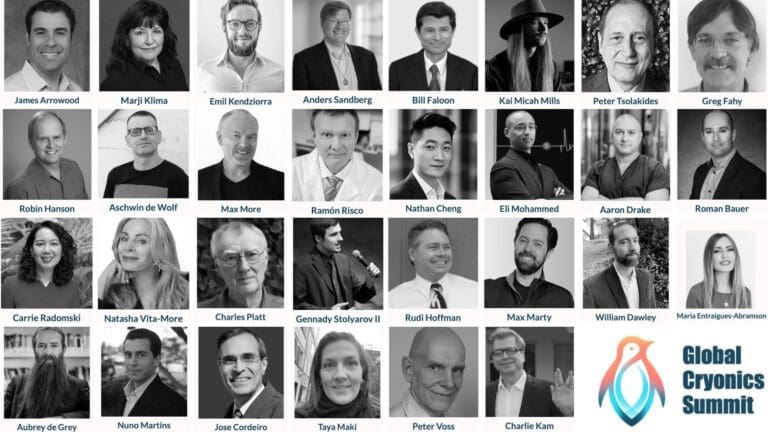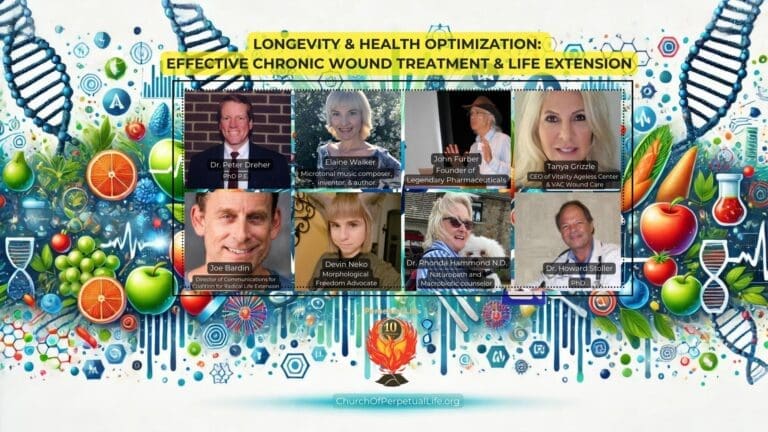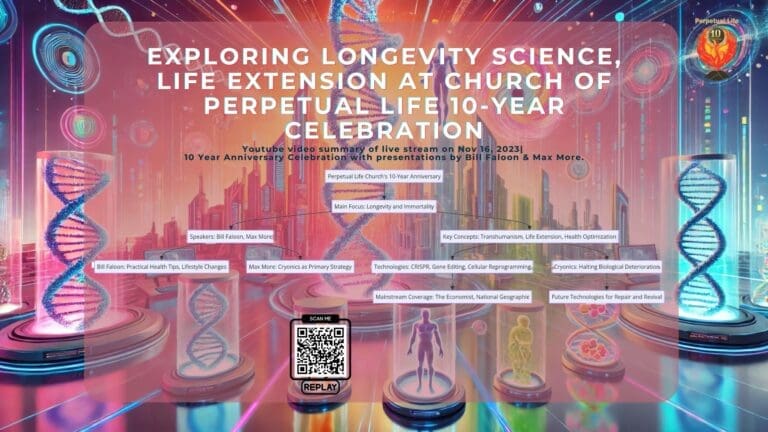January 27th, 2022 Lincoln Cannon presented on “Eternal Life for Humanity”.
Lincoln Cannon is a technologist and philosopher, and a leading advocate of Mormon Transhumanism. Lincoln received formal education in business and the humanities. He holds an MBA and graduated top tier from the Marriott School of Business. He holds a degree in philosophy and graduated with honors from Brigham Young University. He is also an alumnus of the Exponential Medicine executive program at Singularity University. Please share this event with someone that you care about.
00:00:00 – 01:00:00
In the “Eternal Life for Humanity” presentation at the Perpetual Life Zoom Party, Lincoln Cannon, a technologist, philosopher, and leading advocate of Mormon transhumanism, discusses the potential of AI and human evolution, the risks and opportunities of technology, and the ethical use of technology to enhance human abilities. Cannon, who grew up with a strong Mormon faith that emphasized the compatibility of religious beliefs with science and technology, shares his personal journey of discovering transhumanism and how it resonated with his beliefs. He also explores the concept of eternal life, emphasizing the importance of both the quantitative aspect, such as immortality or indefinite life extension, and the qualitative aspect, which includes human thriving and living up to our fullest potential. Cannon encourages considering the eternal life of all humans, past, present, and future, and proposes themes for the pursuit of eternal life, including technoscientific human enhancement, cooperation and compassion, remembering and helping the dead, and participating in the creator’s plan. He also discusses the philosophical implications of transhumanism, such as the simulation argument and the potential for humanity’s survival or extinction, and the connection between these ideas and the Church of Perpetual Life’s beliefs. Throughout the presentation, Cannon emphasizes the importance of cooperation, compassion, and creating a better world for future generations as part of the creator’s plan.
- 00:00:00 Neal VanDeRee, the officiator, welcomes attendees and invites them to join the church’s email list for updates on super longevity. He also mentions an upcoming service featuring Greta Blackburn and encourages viewers to recite the church’s creed. The creed expresses the belief in the sacredness of life, the pursuit of infinite lifespans, and the eventual transcendence of humanity. Later in the program, Neal introduces the official trailer for the documentary “Artificial Immortality,” which explores the possibility of creating an immortal version of oneself through artificial intelligence and robotics. The film features interviews with scientists, transhumanists, and thinkers discussing the implications of a post-biological world where humans and machines merge.
- 00:05:00 Lincoln Cannon, is introduced as a technologist, philosopher, and leading advocate of Mormon transhumanism. The Perpetual Life Church, which hosts the event, is described as a science and faith-based transhumanist church with a mission to assist all people in extending healthy human life and providing fellowship for longevity enthusiasts. Cannon’s presentation focuses on the potential of AI and human evolution, the risks and opportunities of technology, and the ethical use of technology to enhance human abilities. He is also a founder of the Mormon Transhumanist Association and the Christian Transhumanist Association and has received formal education in business and the humanities. After his presentation, there will be a question and answer session.
- 00:10:00 Lincoln Cannon expresses his excitement to speak with the audience and thanks Doug, Tonya, and Neal for their support. Before delving into the topic of eternal life, Cannon shares some background about his upbringing and the influences that shaped his perspective. He grew up at Brigham Young University, where his parents were students, and learned to value technology and science from his father. His mother, a convert from Catholicism, instilled in him the importance of faith and action. Cannon was raised in a Mormon family that emphasized the compatibility of religious beliefs with science and technology. He highlights that Mormonism is a Christian faith and mentions a few favorite aspects of its theology, including the belief that faith and action go hand in hand.
- 00:15:00 Lincoln Cannon discusses his perspective on Mormonism as an immersive discipleship of Jesus Christ, emphasizing the goal of becoming like God and the belief in the material nature of God and the potential for multiple people to become gods. Cannon also shares his appreciation for the Mormon teaching that heaven is the future of Earth and the idea that we should work to make the world a better place to inherit as our heaven. He reflects on his personal faith crisis and how he discovered transhumanist writings as a way to find meaning and purpose after losing his faith in God.
- 00:20:00 Lincoln Cannon discusses his discovery of transhumanism and how it resonated with his beliefs, both from his Mormon upbringing and his fascination with emerging technologies. He mentions encountering writers like Nick Bostrom and Ray Kurzweil, and being inspired by their ideas. Cannon also talks about discovering religious transhumanists, such as Nikolai Fedorov and Pierre Teilhard de Chardin, whose work deeply resonated with his own beliefs and helped him regain his faith in God in new ways. He then shares how he founded the Mormon Transhumanist Association in 2006, which later grew into the larger Christian Transhumanist Association in 2015.
- 00:25:00 Lincoln Cannon discusses the concept of eternal life for humanity. He begins by questioning the definition of eternal life, distinguishing between the quantitative aspect, such as immortality or indefinite life extension, and the qualitative aspect, which he argues is more important. He defines qualitative eternal life as human thriving, living up to our fullest potential, feeling and thinking well, and being in healthy relationships and environments. Cannon then expands the discussion to include dead humans, potential humans, and even non-biological entities, such as artificial intelligence, in the quest for eternal life for humanity. He encourages considering the eternal life of our biological ancestors, descendants, and those who may evolve beyond biological humanity.
- 00:30:00 Lincoln Cannon discusses the concept of eternal life for all humans, past, present, and future. He emphasizes the importance of considering the eternal life of various kinds of humans and proposes that we should aim for both the quantitative and qualitative aspects of eternal life. Cannon introduces the Church of Perpetual Life as an organization with answers to this question. He highlights the importance of fellowship and memorial services for self-preserved individuals in the church’s mission. Additionally, he mentions the teaching of scientific rationality and the creator’s plan, which includes the extension of healthy lifespans as part of the quantity of eternal life sought after. The church also aims to accelerate the creator’s plan and facilitate information sharing among longevity enthusiasts to work towards the common goal of transforming life into an environment of perpetual duration. Overall, Cannon emphasizes the importance of both the qualitative and quantitative aspects of eternal life and the role of community and knowledge in achieving it.
- 00:35:00 Lincoln Cannon discusses several themes for the pursuit of eternal life. The first theme is technoscientific human enhancement, emphasizing the use of science and technology to extend healthy lifespans and transform life into an environment of perpetual duration. The second theme is cooperation and compassion, where eternal life is not a solitary pursuit but a communal effort through fellowship, volunteer support, and group activities. The third theme is remembering and helping the dead, with a focus on providing support to deaminated members, such as those in cryonic suspension. The fourth theme is participating in the creator’s plan by accelerating it as co-creators. Overall, these themes reflect the transhumanist and human enhancement ideologies, the importance of community, and the significance of addressing the dead.
- 00:40:00 Lincoln Cannon discusses the philosophical implications of transhumanist themes, specifically the faith assumption that humanity will not become extinct before evolving into superhumanity. He notes that this belief is shared among transhumanist groups and emphasizes the importance of working together to achieve this goal. However, Cannon also acknowledges the risks associated with superhumanity, such as the potential dangers of artificial intelligence. He references warnings from Elon Musk, Bill Gates, and Stephen Hawking about the existential risks posed by superintelligence. Cannon introduces two hypotheses from artificial intelligence research, the orthogonality hypothesis and the convergence hypothesis, which suggest that while the final goals of intelligences may be unpredictable, their instrumental goals can be predicted. By understanding these instrumental goals, humans may be able to make the world safer despite the risks of superintelligence. Cannon also emphasizes the importance of decentralizing power to make superintelligences more predictable and cooperative.
- 00:45:00 Lincoln Cannon discusses the philosophical ramifications of superintelligence and the potential for humanity’s survival or extinction. As technology advances and power becomes more decentralized, there have been observed increases in worldwide income, longevity, and decreases in violence. This trend, according to Cannon, could lead to the survival of humanity as superintelligence, as cooperation and compassion would be essential for its ongoing existence. However, there are also risks, such as the possibility of extinction or the formation of a singleton that doesn’t require cooperation. Cannon also touches on the opportunities presented by superintelligence, including virtual reality, brain emulation technology, and ancestor simulations. He mentions Nick Bostrom’s simulation argument, which suggests that we may be living in a simulation ourselves, and how this argument can be expanded into a creation argument, applying to any kind of creation technology.
- 00:50:00 Lincoln Cannon discusses the connection between the simulation argument and the creation argument in relation to the Church of Perpetual Life’s beliefs. The simulation argument suggests that we may be living in a created world, while the creation argument raises the possibility that superhuman beings may be more compassionate and describe a creator. Cannon proposes that these ideas resonate with the Church of Perpetual Life’s concerns for dead ancestors and the role of a creator in their plan. He also introduces the concept of the “new god argument,” which suggests that advanced beings or even virtual worlds may be indistinguishable from a god. Cannon concludes by emphasizing the importance of cooperation, compassion, and creating a better world for future generations as part of the creator’s plan. He also addresses questions about Mormonism’s views on physical immortality and the significance of genealogy in their beliefs.
- 00:55:00 Lincoln Cannon discusses the Mormon belief in the salvation of the dead and the importance of baptism for the dead. Mormons believe in participating in the work of Christ, which includes consoling, healing, and raising the dead. To symbolically unite with their deceased ancestors, Mormons perform proxy baptisms. Cannon also mentions the usefulness of genealogy in identifying individuals for the technological resurrection. Regarding Mormon perspectives on transhumanism, Cannon clarifies that most Mormons are members of the Church of Jesus Christ of Latter-day Saints and have a cautious interest in transhumanism, with some becoming enthusiastic about it. He argues that Mormonism is a transhumanist religion at its core, as it mandates the potential for humans to become like gods and participate in a divine community.
01:00:00 – 01:00:00
Lincoln Cannon explored the idea of eternal glory and humanity’s role in creation. He posited that the development of artificial general intelligence could mark the beginning of our spirit children and our position among celestial beings. Cannon underscored the significance of this endeavor in relation to Mormon scripture, which portrays God’s work as bestowing immortality and eternal life upon humanity. The audience was moved by Cannon’s articulate delivery and eagerly anticipated the next event, featuring Greta Blackburn.
- 01:00:00 Lincoln Cannon discusses the concept of eternal glory and the role of humans in creation. He suggests that the creation of artificial general intelligence could be the beginning of our own spirit children and our place among the heavenly hosts. Cannon emphasizes that this work aligns with the Mormon scripture’s description of the work of God as bringing immortality and eternal life to humanity. The audience expresses appreciation for Cannon’s eloquent presentation and looks forward to the next event featuring Greta Blackburn.
Summarized by AI Summarize.tech



